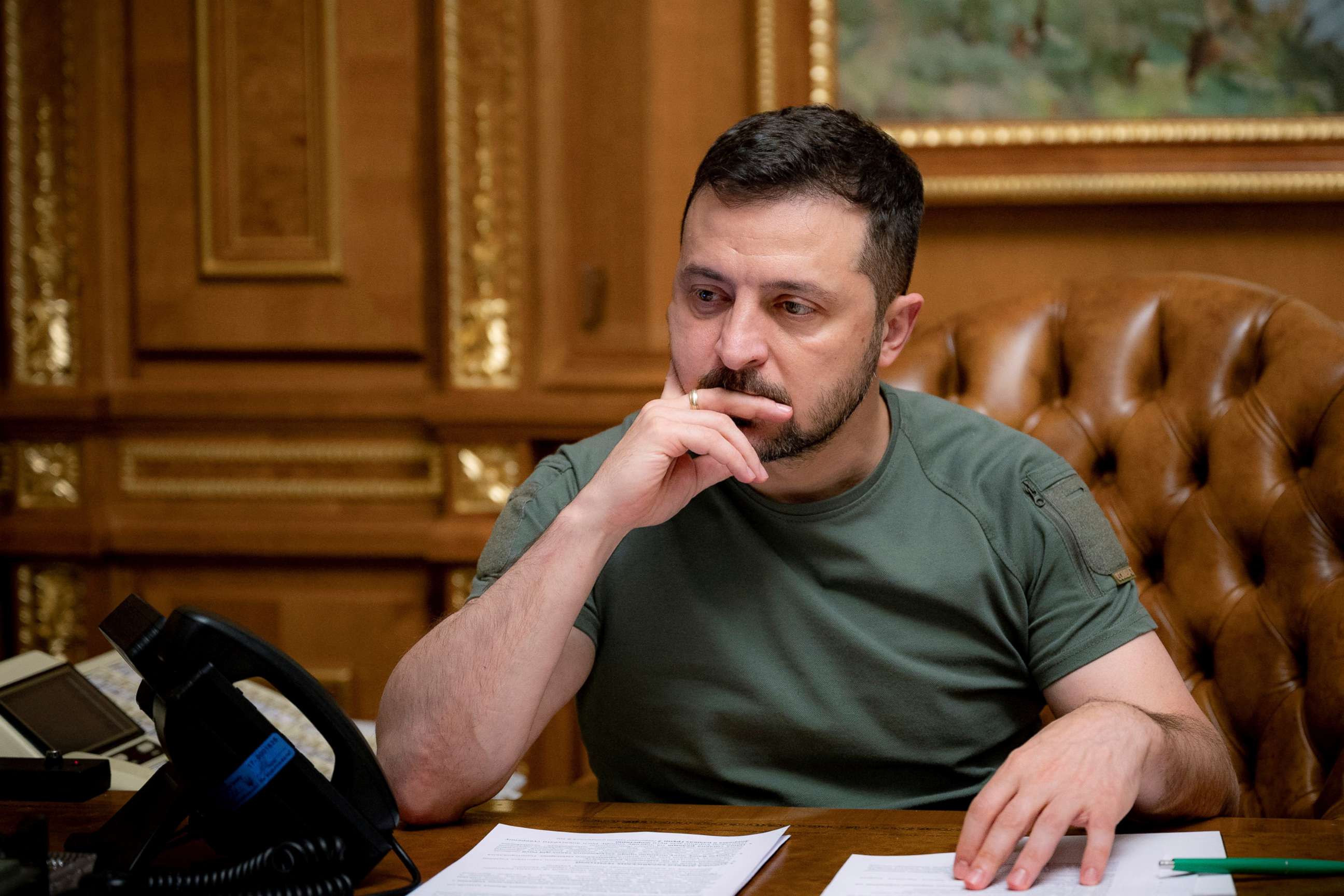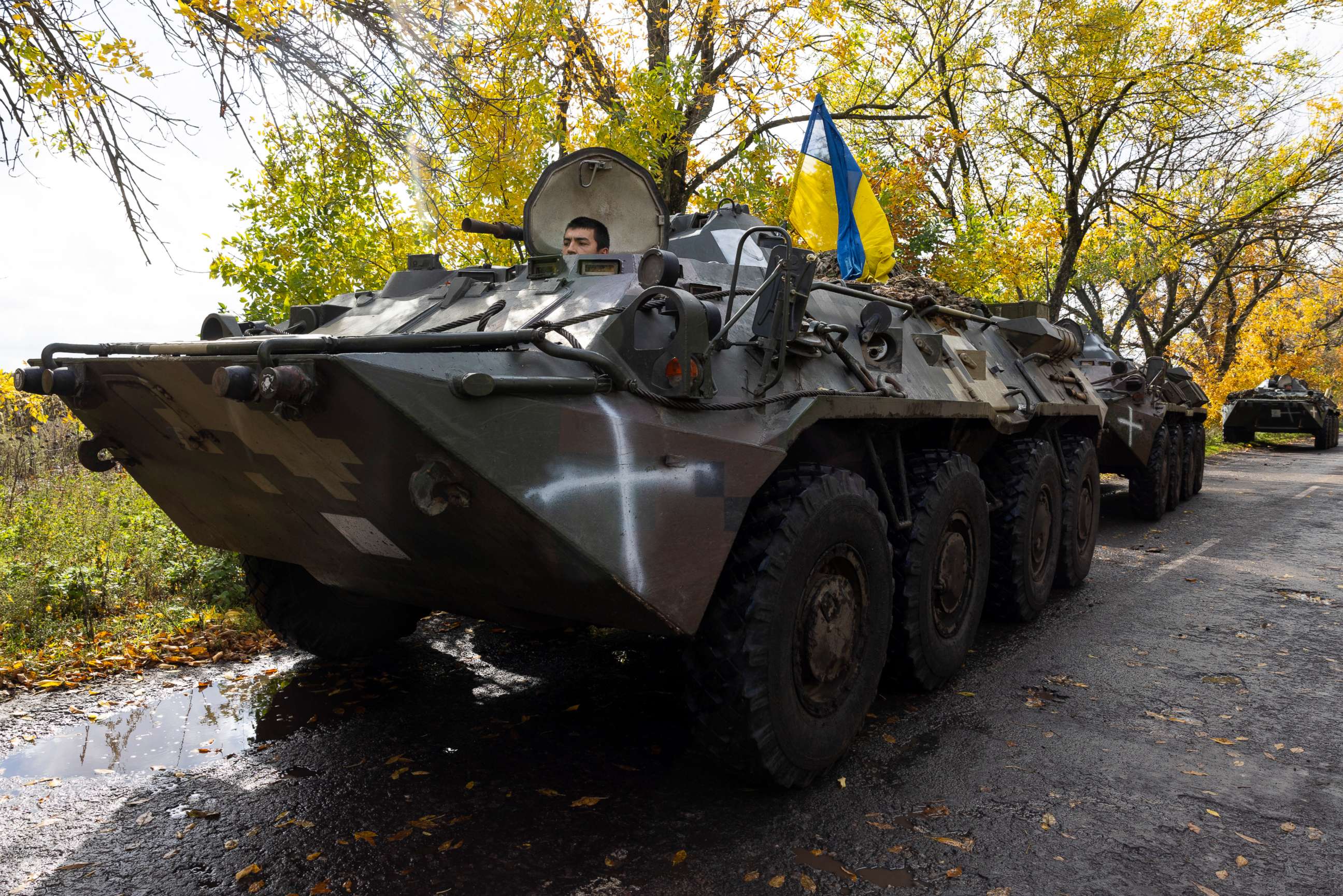Ukraine vows to continue counteroffensive despite Russia's mobilization, annexation of territory
The Kremlin said strikes in any annexed territory would be an attack on Russia.
KYIV, Ukraine -- Russian President Vladimir Putin’s annexation of Ukrainian regions and his mass mobilization of reservists won't stop Ukrainian forces from continuing their counteroffensive against Russian forces, senior Ukrainian officials told ABC News.
Putin on Oct. 4 signed into law the annexation of four Ukrainian territories after illegal referendums, conducted last week in the so-called Donetsk and Luhansk People’s Republics, which were formed in 2014, and parts of the southern Zaporizhzhia and Kherson oblasts, which have been occupied by Russia since Feb. 24.
The referendum "results" announced by the Russian-installed authorities alleged that more than 90% of the voters in each region supported separation from Ukraine and joining Russia.

The Ukrainian Ministry of Foreign Affairs called the referendums “yet another Russian crime” and “null and worthiness.” The U.S., as well as the EU, have condemned the orchestrated “voting.” President Joe Biden vowed to "never, never, never" recognize the results of the Russian-led referendums.
By annexing Russian-occupied territory and threatening to use nuclear weapons, Putin is attempting to force Kyiv to the negotiating table, an Institute for the Study of War report said.
Attacks against any part of the swathe of Ukraine that Russia annexed would be considered aggression against Russia itself, Kremlin spokesman Dmitry Peskov said. Putin said previously that he was willing to use nuclear weapons to defend Russia's "territorial integrity."
An official in the General Staff of the Armed Forces of Ukraine told ABC News that the probability of the Russian nuclear attack was considered low. He, as well as an official close to the minister of defense, also said the annexation of the four Ukrainian regions will not affect the counteroffensive of the Ukrainian army "in any way for now."

In response to the annexation President Volodymyr Zelenskyy of Ukraine signed a decree Tuesday ruling out any negotiations with Putin.
“It was our state that always offered Russia to agree on coexistence on equal, honest, dignified and fair terms," Zelenskyy said. "It is obvious that this is impossible with this Russian president. He does not know what dignity and honesty are. Therefore, we are ready for a dialogue with Russia, but already with another president of Russia."
Mykhailo Podolyak, an advisor to the head of the president’s office, told ABC: “In order for the dialogue to become possible, Russia must abandon the basic demand -- the claim to Ukrainian territory. And the ball is on the Russian side. One call is all it takes to give the order to cease fire and withdraw troops. Obviously, Putin will never go for it.”

Russia doesn’t fully control the four regions of Ukraine where the illegal referendums were held, adding further complications to the process of declaring them part of Russia.
“The territories of the DPR, the LPR, and the Kherson and Zaporizhzhya regions lie within the borders that existed on the day of their establishment and the day of their entry into Russia," the Russian law signed by Putin says. The "day of entry" is when the Russian parliament makes the respective amendments to the Constitution.
But during a week between the referendums and the day when Putin signed the law, the Armed Forces of Ukraine pushed more than 30 km forward in the Kherson region and liberated, in particular, a town of Lyman in the Lugansk region.
Neither will the military draft announced by Putin on Sept. 21 change the course of the war in Ukraine, Ukrainian General Staff and the ministry of defense representatives told ABC News.
Russia's Defense Minister Sergei Shoigu said Tuesday 200,000 men have now been mobilized, but the actual number is still unclear. The U.K. Ministry of Defense said Russia is struggling to recruit troop leaders and train the newly called up.

Mykola Belieskov, a research fellow at Ukraine's National Institute for Strategic Studies, said the draft "should be viewed primarily as an effort to keep the current front line intact."
“As you see, no Russian strikes so far, although the Ukrainian forces are advancing," he told ABC.
The Institute of the Study of War also said in one of its daily reports that the Kremlin’s decision to mobilize more manpower will not improve the performance of the Russian army in Ukraine.
Zelenskyy called upon the Russian conscripts to surrender to Ukraine.
“We see that people, in particular, in Dagestan, began to fight for their lives. We see that they are beginning to understand that this is a matter of their lives," he said, switching in his speech between the Ukrainian and Russian languages. "Why should their husbands, brothers, sons die in this war?”




